
The United Nations has warned there is a serious risk of violence escalating in Sudan’s West Darfur region as heavy battles raged across the country despite the warring sides agreeing to a new ceasefire.
Black clouds rose over the capital Khartoum on Friday as foreign governments scrambled to organise mass evacuations of their citizens, with Turkey’s defence ministry reporting that one of their military transport aircraft had come under fire.
There have been multiple failed truce efforts since a violent power struggle broke out on April 15 between Sudan’s army led by General Abdel Fattah al-Burhan and the paramilitary Rapid Support Forces (RSF) commanded by al-Burhan’s former deputy and fellow coup leader Mohamed Hamdan Dagalo, known as “Hemedti”.
On Thursday, the two sides agreed to extend a repeatedly broken ceasefire for three more days, with the US, Saudi Arabia, the African Union, the UN and others hoping it would help forge a “more durable cessation of hostilities”.
At least 512 people have been killed in Sudan since the conflict erupted and more than 4,100 wounded, according to the United Nations, which believed the real toll is much higher. The Sudan Doctors Union said at least 387 civilians had been killed.
The ceasefire is supposed to last until Sunday at midnight.
A Turkish evacuation plane came under fire as it was landing at Wadi Seyidna airport in Omdurman on Friday but there were no injuries, Turkey’s defence ministry said.
Darfur violence
The fighting has also reawakened a two-decade-old conflict in western Darfur where dozens have died this week.
In el-Geneina, capital of West Darfur, a major hospital supported by medical charity Doctors without Borders was looted during a violent intrusion over the past two days, the group said.
Al Jazeera’s Hiba Morgan, reporting from Khartoum, said the situation in el-Geneina was dire.
“We spoke to residents in West Darfur, where there has been not only intense fighting between the RSF and the army, but also between Arab militias and ethnic Darfuri tribes,” she said.
Darfur is a region coming out of 20 years of civil war that saw Arabs being pitted against Darfuri tribes.
“Residents say that the city is mostly calm today but they heard sporadic gunfire. Thousands who were able to flee have crossed the border into neighbouring Chad. But those who remain behind are still trapped,” Morgan said.

Civilians scramble to flee
The violence in Sudan has sent tens of thousands of refugees across the country’s borders and threatens to compound instability across a volatile swath of Africa between the Sahel and the Red Sea.
Among Sudan’s neighbours, Egypt said it had taken in 16,000 people, while 20,000 had entered Chad and the UN refugee agency said more than 14,000 had crossed into South Sudan, which won independence from Khartoum in 2011 after decades of civil war.
Despite the heavy losses, al-Burhan has ruled out negotiations with the Dagalo, accusing him of orchestrating a rebellion against the state, a day after the military expressed openness to the talks under the initiative.
Dagalo “wants to rule Sudan, seize its resources and magnify his wealth,” al-Burhan said in an interview with US-funded Alhurra TV, denying that he wants power for himself.
Solomon Dersso, founder and director of Amani Africa, a policy research organisation based in Addis Ababa, said there was a lack of pressure on the warring sides to enter negotiations.
“There is a need for scaling up pressure on and the diplomatic effort not only in terms of engaging and also trying to get the two sides to commit to a ceasefire but also importantly … the two sides need to be pressed by the international community to spare civilians,” he told Al Jazeera.







